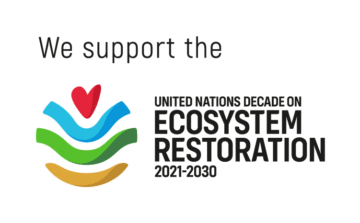On World Environment Day, which fell on June 5th of this year, the UN officially launched the Decade on Ecosystem Restoration. The Decade of Restoration is meant to promote the United Nation’s environmental goals, and facilitate global cooperation for the restoration of degraded ecosystems.
The UN Decade on Ecosystem Restoration symbolizes a chance to revive the natural world that supports us all. It is these next ten years that scientists claim will count the most in the fight to avert climate change, and halt irreversible biodiversity loss. The UN outlines ten actions that will build a #GenerationRestoration.

10 years to restore our planet. 10 actions that count:
1. Empower a global movement
The UN Decade is designed to connect the actions of many, and empower them in this way. Groups and individuals can get informed about restoration opportunities in there area. They can join any initiative or even start their own! In this way, many smaller projects can join forces, and together, fight for a better, greener future.
2. Finance restoration on the ground
Organizations involved in restoration are often underfunded and face financial insecurity. While the benefits of restoration far outweight the costs, initial investments in the magnitude of billions are needed. The UN Decade raises awareness on these organizations, so that businesses, individuals, and other parties can consider giving a donation.
3. Set the right incentives
Caring for nature has often meant foregoing some of the financial gains of less sustainable practices. However, there are ways to change this: agricultural and fishing subsidies that often finance harmful practices could be used to support restoration instead. In the long-term, healthier ecosystems can produce bigger harvests, more secure incomes and a healthier environment for people.
4. Celebrate leadership
The UN Decade will celebrate leadership in a way that will encourage many more to step up and act.
5. Shift behaviors
Deforestation, the depletion of fish stocks and the degradation of agricultural soils are all caused by global consumption patterns. The UN Decade will work with all partners to identify and encourage restoration-friendly consumption. This can range from shifting diets to promotion restoration-based products.
6. Invest in research
Restoration is complex. Practices that work in one ecosystem may have adverse impacts in another. Scientific understanding of how to restore and adapt ecosystems is still developing. Considerable investments are required to identify the best practices to restore our planet.
7. Build up capacity
As a priority, the UN Decade’s strategy seeks to build the capacity of marginalized groups that stand to lose most from the continued destruction of ecosystems – such as indigenous peoples, women and youth to take an active role in restoration.
8. Celebrate a culture of restoration
The power to revive our environment does not lie with governments, experts and practitioners alone. Far from it: Shifting from plundering the planet to healing it is a cultural challenge. The UN Decade’s strategy therefore calls on artists, storytellers, producers, musicians and connectors to join the #GenerationRestoration.
9. Build up the next generation
It is youth and future generations who are most impacted by the consequences of the current rapid destruction of ecosystems. The UN Decade’s strategy makes a direct link between the wellbeing of youth and the goals of restoration.
10. Listen and learn
We can all learn from each other’s knowledge and experience in restoration. The UN Decade acts as a platform to share restoration efforts around the globe. Have a look at the different efforts right now: decadeonrestoration.org/what-ecosystem-restoration




